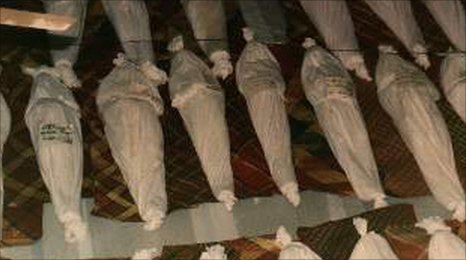-By: Political Correspondent

(Lanka-e-News -19.April.2025, 11.50 PM) On a warm summer evening in London, the crescent moon will hang silently above a mosque in East London, where British Muslims gather not just to pray, but to remember a massacre 5,431 miles away — a memory soaked in blood, silence, and shame.
August 3rd, 1990. Kathankudi, Sri Lanka.
Two mosques. Over 147 Muslims shot and butchered in their evening prayer.
And the perpetrators? Not a foreign invading force, not an enemy state — but homegrown Sri Lankan rebels, the Liberation Tigers of Tamil Eelam (LTTE), who that night went from "freedom fighters" to gravediggers of their own credibility.
Now, 35 years later, the world is finally beginning to call it what it was: a massacre. A war crime. A crime against humanity.
The international community — which could write thesis-length reports on every sneeze in Syria or Gaza — has maintained a baffling radio silence on Kathankudi. Perhaps because these weren’t headline-friendly victims. No global hashtags. No viral Instagram filters. Just rural, pious Muslims who were, quite literally, shot down while kneeling in prayer.
It took the British Muslim Association to say: “Enough.”
This August, a commemorative exhibition will be held in London with panels, survivors, and a painful but necessary film screening. One event organiser, a second-generation British-Sri Lankan Muslim, said, “Our parents buried this trauma. We’re here to dig it up and demand answers.”
But there’s an even more curious subplot unfolding.
Many of the LTTE’s former global financiers, smugglers, and “logistics handlers” have since rebranded themselves as successful businessmen, tech entrepreneurs, mobile service providers, even humanitarian donors.
A few drive Teslas, vacation in Santorini, and invest in cricket franchises.
One even tried to launch a vegan biryani startup. Because nothing says "atonement" like turmeric-infused quinoa.
But the victims of Kathankudi — now armed with top-tier international legal advisors — aren’t laughing.
They’re coming for the money.
A London-based team of lawyers has filed preliminary motions demanding financial compensation from “entities and individuals who materially supported the LTTE’s operations between 1987 and 2009.” This includes businessmen who laundered weapons cash through “charity” channels and those who now claim to be “neutral diaspora community leaders.”
The irony? Some of these same figures regularly lecture at British universities about “peacebuilding” in post-war Sri Lanka.
One Muslim community activist put it bluntly:
“You can’t shoot our fathers and sell us SIM cards. We’re not your customers. We’re your witnesses.”
Even more explosively, a dossier has been handed over to the UK’s Home Office, containing the names of 31 British citizens who allegedly participated in the funding, training, or logistical planning of LTTE attacks — including Kathankudi., who werefrom Eastern Province of the Sri Lanka.
Under the UK’s updated Citizenship Deprivation Laws, anyone found to have committed or supported war crimes or crimes against humanity can be stripped of their citizenship and prosecuted in the UK — regardless of where the crime occurred.
One source close to the dossier says at least four individuals currently run “cultural organisations” in the Midlands, while two others are active in Tamil political lobbying groups.
Their biggest mistake?
Not leaving the past behind — but uploading it to social media in 2009 under the tag #PuliPower.
In the years following the Kathankudi massacre, the Muslim community — especially in the Eastern Province — made a choice no one expected: they did not radicalise. They did not retaliate.
Instead, many aligned themselves with the Sri Lankan military, not because they loved uniforms, but because they wanted to protect their families.
This alliance — often overlooked or labelled as “traitorous” by some diaspora hardliners — was driven by one truth: the enemy of my child's murderer is my conditional friend.
The massacre hardened the community, not into militants, but into survivors. Into people who knew that peace is sometimes less about justice and more about not losing any more sons.
The international campaign is picking up speed. Panels are being organised in Geneva, London, and New York, demanding that Kathankudi be officially recognised by the UN as a war crime. Letters have been sent to the UNHRC, ICC, and even the British Broadcasting Corporation (which somehow never managed a single documentary on this event despite producing eight on Sri Lankan crabs).
The campaign is not just about justice. It’s about memory. It’s about finally lifting the shroud of silence over a massacre that was politically inconvenient to acknowledge — because the victims were not Tamil, not Sinhalese, not white — but Muslim.
This isn’t about reopening wounds. It’s about cleaning them properly, before infection turns into denial.
The LTTE’s apologists and ex-financiers cannot use time as a disinfectant.
Thirty-five years is long enough to heal. Now it’s time to account.
As one survivor put it at a recent community gathering in Colombo:
“They killed our prayers. But we’re still here. Still praying. Now, we’re also suing.”
-By: Political Correspondent
---------------------------
by (2025-04-19 18:29:19)
Leave a Reply